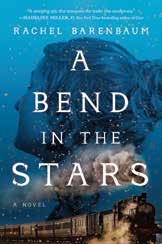Tammy Hepps
A Novel Amplifies the Lens of History

A Bend in the Stars by Rachel Barenbaum (Grand Central Publishing, $28) is the escapist fiction we need for the terrible times in which we find ourselves. I mean “escapist” in the best sense of the term—without intending to, I read it in one sitting, catapulted from cliffhanger to cliffhanger, as all the terrifying headlines of the present day temporarily receded.
Russia in the summer of 1914 is, of course, no place to escape to, not for anyone living in a dictatorship mobilizing for war, and certainly not for the Jewish characters at the center of Barenbaum’s plot. Living under one roof in Kovno (today, central Lithuania) are Miri Abramov, one of Russia’s few female surgeons, her brother Vanya, seemingly one of the world’s top physicists, and their grandmother, a matchmaker and self-defense expert. These improbable characters flee their comfortable home for improbable reasons. Vanya departs first with Miri’s fiancé, Yuri, to head towards the upcoming eclipse, as part of a plan to solve relativity before Einstein does and thus earn them all passage to America. His disappearance lands his remaining family under house arrest, and after the unintended consequences of Miri’s failure to save a mortally wounded child in her care, she flees with Sasha, a deserted soldier who was pushed from a train at just the right moment.
The two pairs of characters race towards the eclipse from near-death experience to near-death experience, trailed by the henchmen of an evil professor who wants to claim Vanya’s work as his own, and dodging Russian army officers eager to punish not only Sasha, but also Vanya and Yuri, who join and desert the army in the space of days. But whatever the farfetched circumstances that bring them to the brink of each disaster, what most endangers Barenbaum’s characters is that they are Jews. Their identity gives everyone they encounter tacit permission not just to thwart them, but also to commit violence against them in the process. It would almost seem the most far-fetched element of all were it not for Barenbaum’s obviously meticulous research, which lends each episode the feeling of underlying authenticity.
And this is the reason why I say A Bend in the Stars is the escapist fiction for our times. Buried within the pleasures of Barenbaum’s impeccable plotting and a thoroughly convincing love triangle are deep truths about being Jewish. “Why does it still have to come down to that—to being Jewish?” laments Yuri, after an unexpected and devastating betrayal. It is Miri’s grandmother who sums up the problem. Referring to a Jewish massacre from her grandmother’s youth, Miri asserts, “There won’t be another Odessa. Russia has changed since then.” Her grandmother replies, “Death will come again. They’ll blame us Jews…Haven’t I taught you? Hasn’t the past been loud enough?”
The past is somehow never loud enough when today’s headlines are what they are. Novelists like Barenbaum who do the work of amplifying the lessons of history render us all an important service.
TAMMY HEPPS is a historian and technologist living in Pittsburgh’s Squirrel Hill.
 Please wait...
Please wait...